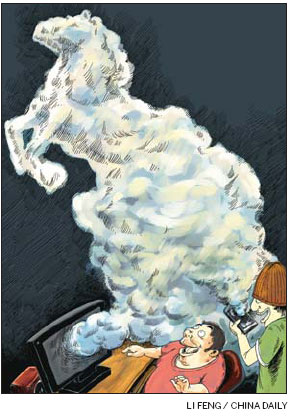Life
When truth is nothing but an oft-repeated lie
By Jules Quartly (China Daily)
Updated: 2010-12-29 07:53
 |
Large Medium Small |
The year of 2010 was a tough year for writer Louis Cha, who reportedly died and was resurrected, twice. The 86-year-old, better known by his nom de plume, Jing Yong, is the best-selling Chinese author in the world and is now an Internet buzzword for being written off - or declared dead when you're not.

"Jing Yong bei cishi" was rated sixth among Xinhua's roundup of the top Internet memes of the year, reflecting perhaps, that words in the ether carry as much weight as facts in reality, or, our interconnectivity is killing us.
Lies spread in an Internet minute. In the time it takes to receive a tweet they're forwarded at the press of a function key to thousands of followers and picked up by hundreds of blogs, then reposted by websites - repeat a lie enough times and people will believe it.
A lot of these Internet rumors now find critical mass on micro blogs, and this was true in the recent case of the Untimely and Untrue End of Jing Yong. By most accounts the rumor started on the BBS forum Jing Yong at Baidu.com. It then hit Twitter and Renren before coalescing on Sina Weibo. It became a "fact" when China News Week reposted the story to its 300,000 followers.
On the plus side, an earnest reporter in Hong Kong cast doubt on the "news" 30 minutes later by posting that Jing Yong had accepted an honorary doctorate the day before, adding for good measure the hospital he was supposed to have passed away at did not exist. Three editors lost their jobs at China News Week, suggesting the magazine still believes it's in the truth business.
Much the same thing happened to me a few weeks ago when a number of Sina Weibo accounts were tweeting the "news" that young mime artist Lin Miaoke and Jackie Chan were going to duet the song Rabbits Love Carrots for the CCTV Spring Festival Gala. No truth in the rumor at all, Lin's management confirmed, the news was made up by the song's producers to publicize it.

Unscrupulous PR agencies and advertisers have been quick to spot the potential of the micro blog medium, which is practically free and the effects priceless. They know there's no such thing as bad publicity, unless it's no publicity. Case in point is the horror movie Midnight Beating, which premiered on Christmas Eve.
In an inspired but misleading piece of guerilla advertising, photos of the lead actors, Francis Ng and Yao Di, wearing pajamas and disporting themselves on an unmade bed, were passed around on various micro blogs. The photos are set up to look as if they had taken them themselves in a love motel. They were uploaded to create a rumor that the married 48-year-old Ng was having an affair with Yao. And it worked.
It only remained for the thespians to come clean a few days later and act aggrieved. Ng's manager said his client reserved the right to demand compensation for the "spiritual" and economic losses caused by the "vicious" use of the photos. The interesting thing is, no one was really surprised or even cared about the deception and a week after the event it had been forgotten.
It appears that we have become inured to gossip or news and are in a state of suspended disbelief when we are faced with it. In some ways this is a bad thing, because nobody quite believes what anyone's saying any more. On the other hand, it's only by being convinced of the small truths that we fall for the big lies. Perhaps new media has created a new cynicism and maybe this isn't bad thing. Which brings us back to Xinhua's Internet meme top 10, the winner being: "Shenme doushi fuyun", which roughly translated means, "Everything's meaningless (like fleeting clouds)."
How appropriate.